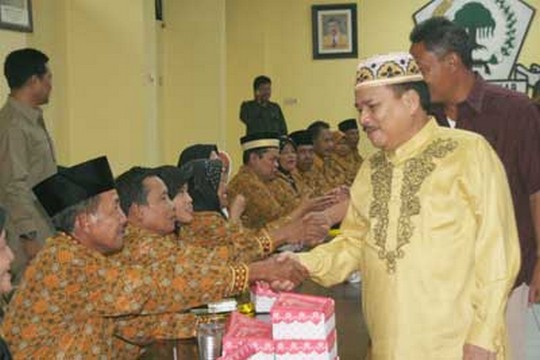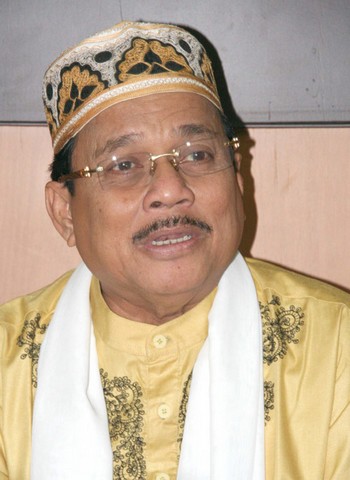Friends and connections hold the key to riches in Kalimantan’s Barito region
Akiko Morishita
HA Sulaiman HB, aka Haji LemanGolkar Kalimantan Selatan |
Business is booming in Indonesia and not just in Jakarta. In the regions, the last few decades of economic growth saw the slow emergence of a new breed of politically-connected local businesspeople who sometimes achieved extraordinary wealth, especially in resource-rich provinces. With the new era of democracy and decentralisation, such people have come into their own, using their political connections to increase their wealth, and their wealth to buy political influence. One such provincial strongman is Haji Leman, a wily timber baron and coal miner who has become the power behind several thrones in South and Central Kalimantan.
Kalimantan’s rich forest resources have long invited extensive logging and continue to do so. Huge tracts of land have been opened for oil palm plantations in the last decade. During the Suharto era the central government exercised complete control through Forest Concession Rights (Hak Pengusahaan Hutan, HPH). It handed them out to state-owned companies, the military, and Jakarta-based conglomerates close to Suharto. In Central Kalimantan, many large-scale logging concessions went to the state-owned enterprise Inhutani III and to well-connected Jakarta-based private timber conglomerates such as Barito Pacific Timber, PT Sari Bumi Kusuma Kalteng, and Djajanti Djaja.
However, local businesspeople also benefited, through subcontracts. They were given jobs ranging from recruiting and supervising workers to managing logging operations. They transported timber from site; they conciliated or intimidated locals who opposed logging. It is common knowledge that many also engaged in illegal logging. The latter was a cooperative effort that allowed contracting companies to meet shortfalls in their annual work plans. Getting locals involved reduced the risks of getting caught, while allowing local partners a chance to accumulate their own capital. Local entrepreneurs secured their positions by building personal connections with the most important local government figures: bureaucrats, politicians, military personnel, and police.
Local businesspeople also benefited, recruiting workers, managing operations, transporting timber and intimidating locals who opposed logging
After the fall of Suharto, Indonesia’s central government transferred much authority to the regional governments. Democratisation brought about free and fair legislative elections, and regional heads were soon directly elected by the people, rather than appointed from above as under Suharto. One outcome of these political shifts was that local contests over government positions and economic resources became fierce. Wealthy local businesspeople were prominent in these contests, alongside well-entrenched bureaucrats. They had made their money during the Suharto’s New Order regime by colluding with local allies in government in exchange for protection. Democratisation offered them the opportunity to expand their influence in the regions.
One such local businessman is HA Sulaiman HB, known to locals as Haji Leman. He operates with significant influence in the Barito region in Kalimantan. The Barito River flows from the northeastern part of the province of Central Kalimantan to Banjarmasin, the provincial capital of South Kalimantan. Building on the money and connections he had accumulated under the New Order, democracy permitted him to expand his influence dramatically.
Haji Leman
Haji Leman was born in 1948 in Marabahan, capital of South Kalimantan’s Barito Kuala district. He is not from a rich family – his father was merely a soldier in the national army. Haji Leman is now big in river transportation, dockyards, shipbuilding, pharmacies, coal mining, and oil palm plantations, all in Central and South Kalimantan.
In the middle and upper Barito, local residents are mainly Dayaks, a loose generic term for the indigenous communities of Borneo. Banjarese, Malay descendants of the aristocrats and subjects of the Banjar Kingdom (1526-1860), live mainly in the lower Barito region. Haji Leman belongs to a Dayak ethnic subgroup known as the Bakumpai, a major indigenous peoples living principally in the middle Barito River basin. Bakumpai people converted to Islam under the strong influence of the Banjar Kingdom, while many other Dayaks converted to Christianity or continue to practice varieties of animism. This ethnic background permitted him to communicate smoothly with both the upstream Dayak communities and with the downstream Banjarese.
At the age of 18, he began a small business in his home area. Using leased riverboats, he purchased commodities in Banjarmasin for resale in upstream towns. For the return trip he bought forest products like rubber and resins and sold them to brokers in Banjarmasin. When the timber boom started in the late 1960s, Haji Leman worked for the Jakarta-based and military-backed timber conglomerate PT Djajanti Djaja, which owned around 280,000 hectares of logging concessions in Central Kalimantan. The company valued his experience and detailed knowledge of local society, and made use of his distribution networks in the region. They put him in charge of shipping logs from timber camps along the upper Barito to Banjarmasin. My local informant told me Haji Leman also paid people for logs they had cut down without official permission, and covertly transported these together with legal timber.
With the capital accumulated from the formal and informal trade in timber, Haji Leman expanded into coal mining in the early 1990s. Obtaining the required Coal Mining Agreement (PKP2B) from the central government was not easy. During the Suharto era these normally went only to multinational companies and a few Jakarta-based domestic companies. But with the help of his political connections, he managed to seek the permit. Once he had it, however, he had problems entering the foreign market. A Taiwanese buyer refused to accept 60,000 tons of coal after it had been shipped on the grounds of poor quality. Haji Leman tried hiring an international consultant to deal with the case but abandoned it due to the high cost. After that he decided to look for a strong, established business partner. A large Jakarta-based conglomerate would have the advantage of financial clout and closer access to national authorities. In turn such conglomerates needed local partners to expand their operations in the regions.
In the mid-1990s Haji Leman entered into a joint venture with the timber conglomerate PT Barito Pacific Timber, which had also moved into coal mining. In 1997, his company became a 10 per cent shareholder in a BPT-affiliated coal company. A few years later Boy Garibaldi Thohir, owner of the big Jakarta-based coal corporation PT Adaro, also sought out Haji Leman for a joint venture. Thohir needed an experienced local partner with a mining permit. Through these joint enterprises and his own mining company, Haji Leman now holds major coal-mining stakes in four districts in Central Kalimantan, and five in South Kalimantan.
Favours
Ever since the Suharto era Haji Leman has nurtured links with local officials, in order to obtain favours and protection. Such officials ranged from heads of local government, top bureaucrats in the regional forestry office, local legislators, and military and police officers. In Central Kalimantan in the early 1990s he built close ties with Asmawi Agani, then district head(bupati) of South Barito, by contracting coal haulage to Asmawi’s trucking company. Both men are of Bakumpai descent. Asmawireportedly became a board member for Haji Leman’s company after retiring from public service. Haji Leman joined the government party Golkar and became its South Kalimantan provincial chairperson in 1998.
 |
Haji Sleman knows how to work a roomGolkar Kalimantan Selatan |
After the fall of Suharto in 1998, much central government authority was transferred to the district level. Bupati could issue small- and medium-scale logging concessions and provide approval for plantation development. (In 2002 their authority to approve logging concessions was reduced again, due to their over-issuance.) These shifts created tremendous opportunities for local elites, and triggered fierce contests for power.
In 2000 Haji Leman helped finance the Central Kalimantan gubernatorial election campaign for his business partner Asmawi Agani, the former South Barito bupati. At this time governors were still elected indirectly within the provincial assembly. He allegedly provided 100 million rupiah (roughly US$12,000) to each member of the assembly, enough to buy Asmawi the job. Haji Leman and the governor then put forward their ethnic, political, and business associates as candidates for bupati in each of the districts throughout the entire Barito region.
In 2000 Haji Leman helped finance the Central Kalimantan gubernatorial election campaign for his business partner Asmawi Agani
Owing in large part to their financial and political support, these friends won the indirect elections for bupati in South Barito in 2001, East Barito in 2003, North Barito in 2003 and Murung Raya in 2003. All four were re-elected in the 2006 and 2008, this time through direct popular elections. They in turn helped Haji Leman boost his business in the region even after the governor, his provincial collaborator, was defeated in the 2005 gubernatorial election. His company has developed oil palm plantations in Murung Raya since the late 1990s, and was granted a timber concession in South Barito in 1999. It also operates coal mining business in South Barito, North Barito, Murung Raya, and Gunung Mas. His local allies have continued to smoothe the way for him.
Golkar
In South Kalimantan Haji Leman has relied on Golkar for his power base. He has remained the provincial party chairman since 1998, and became a regional representative in the nation’s highest legislative body in 1999-2004, the MPR (People’s Consultative Assembly). Although Golkar’s candidates were defeated in the 2000 and 2005 gubernatorial elections, they won the elections for bupati in Tabalongin 2004; Hulu Sungai Tengah in 2000 and 2005; Hulu Sungai Utara and Tapin in 2002 and 2007; and Barito Kuala in 2007. Haji Leman has coal mining businesses in all these districts. His company was also granted timber concessions in Tabalong in 2001 and has developed 12,000 hectares of oil palm plantations in Tapin since 2008.
However, the flipside of greater opportunity is increased uncertainty. Haji Leman’s allies in government are mostly in their second term. They are not allowed to run again in the next elections. So he will need to put forward other friends. It is also impossible to predict how well Golkar will do. If his friends and connections go down, Haji Leman will go down with them. But in that case others will replace him. There are many other local power brokers like Haji Leman competing for the spoils in the provinces.
Akiko Morishita (akikomori77@gmail.com) is adjunct research fellow at Monash University Malaysia, in Petaling Jaya.
This article is part of The Rich in Indonesia feature edition.













